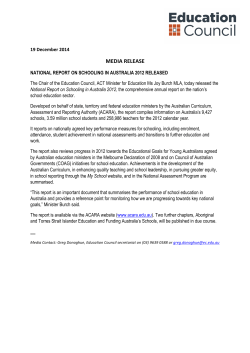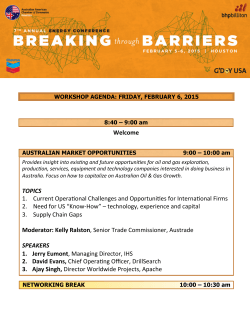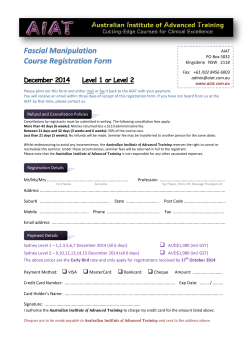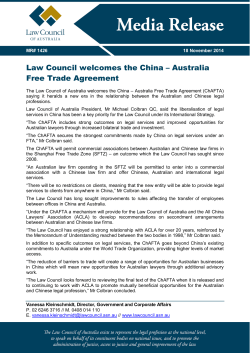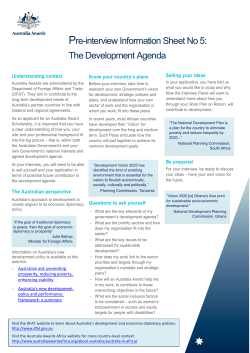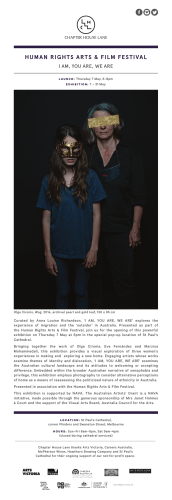
event guide - China Matters
China Matters Youth Policy Meeting Sydney, 6 May 2015 Welcome to the inaugural China Matters Youth Policy Meeting, co-hosted by China Matters and the China Studies Centre at the University of Sydney. This event provides leading postgraduate and honours students and young professionals a platform to discuss the pressing issues facing Australia-China relations today. The meeting has a concrete mission: to formulate one or two policy recommendations for the Australian government on how to engage China as China’s influence in the region increases. It precedes the inaugural China Matters National Meeting with senior figures from policy, business, and security circles that will be held in Canberra later in May. The panel consists of three panellists and a moderator. Each panellist will be given seven minutes to make remarks and is encouraged to take a stand on a controversial issue relating to the panel focus. The moderator will then probe the issue(s) further with the panellists before opening up the discussion to everyone. Comments are expected to be a maximum of four minutes. The ‘jazz club style’ format of the meeting is designed to create a conversation between peers. While panellists are expected to help lead the conversation, their remarks must be brief, so that the majority of the session is an open back-and-forth among all of the participants. Chatham House rules apply. Discussion topic What does China want from the region? What does Australia want from China? China Matters is grateful to its sponsors for their financial support. Order of proceedings 5.45pm Registration 6.00pm Welcoming remarks Professor Kerry Brown, Director of the China Studies Centre at the University of Sydney Ms Linda Jakobson, Founder and Director of China Matters 6.15pm – 7.45pm Interactive panel discussion Moderator: Mr Peter Cai, Editor of China Spectator Panellists: Mr Jiao Li, Research Assistant at the US Studies Centre Mr Andrew Kwon, Research Assistant at Project 21, US Studies Centre Ms Eva O’Dea, Research and Project Manager, China Matters 7.45pm – 8.30pm Refreshments served China Matters is grateful to its sponsors for their financial support. Background Brief China Matters Youth Policy Meeting in Sydney, 6 May 2015 Interaction between Australia and China is more vibrant than at any other time in the past. China remains by far Australia's largest trading partner, largest exports destination and largest source of imports, while Australia is China's eighth largest trading partner. In 2014 bilateral trade totalled USD$128.17 billion. A third of overall Australian exports worth USD$81.4 billion went to China and 20 per cent of Australian imports amounting to USD$46.77 billion came from China. As of 2014, almost 200,000 Australian jobs were sustained by direct goods and services exports to China. Trade and investment flows are expected to further increase following the conclusion of the Australia-China Free Trade Agreement negotiations in November 2014. Bilateral relations were upgraded during Xi Jinping's visit to Australia for the G20 in 2014 to a "comprehensive strategic partnership," which involves strategic level cooperation on political, economic, cultural and military issues. Australia applied to become a founding member of the China-led Asian Infrastructure Investment Bank (AIIB) just before the deadline in March 2015, following much to-and-fro due to US opposition and concerns about how the AIIB will be governed. Yet, despite public displays of closer political ties, during the G20 Prime Minister Tony Abbott was said to have, in private, described Australia’s approach to China as being based on “fear and greed” (SMH, 16 April 2015). In recent years China has become more assertive in the international arena. This has been particularly evident in its actions in the East and South China Seas, for example the ongoing construction by China of artificial islands in disputed areas of the South China Sea, Beijing’s declaration in 2013 of an Air Defence Identification Zone in the East China Sea which included the disputed Diaoyu/Senkaku Islands, and the placement of a deep sea oil rig in disputed waters near Vietnam in 2014. This has led many to question what China’s underlying objectives in the region are. In a number of major foreign policy speeches, President Xi Jinping has articulated a vision for international affairs in the Asian region and China’s role within it. At the Peripheral Diplomacy Work Conference in October 2013, President Xi spoke of China’s desire to forge closer relationships with countries on its periphery and to develop greater regional influence. He said China wishes to construct a new integrated regional economic system in Asia with greater interconnection through the Silk Road Economic Belt, Maritime Silk Road and the AIIB. In a speech on a new Asian security concept in 2014, President Xi said China would get “more deeply involved in the regional cooperation process” and play its part to ensure that China Matters is grateful to its sponsors for their financial support. “development and security in Asia facilitate each other and are mutually reinforcing.” He advocated the establishment of a new regional security architecture and observed that “it is for the people of Asia to run the affairs of Asia, solve the problems of Asia and uphold the security of Asia.” At this year’s Boao Forum President Xi further elaborated his vision of building a “community of common destiny”. Countries should treat each other as equals, respecting their different social systems, development paths and core interests, and avoid interference in others’ internal affairs. The principle of win-win cooperation should underpin greater cooperation in the economic, political, security and cultural fields. The “legitimate security concerns” of each country must be respected and addressed, taking into account “both the history and reality of Asia.” Countries in Asia should also increase levels of exchange and dialogue among different civilizations and development models. According to President Xi, China will “steadfastly pursue” an independent foreign policy of peace, the path of peaceful development and promote a new type of international relations based on win-win cooperation. Questions to consider Panellists and participants are encouraged to consider the following issues: What does China want from the region? Does China desire to be the dominant regional power? Does China see a place for the continued presence of the US in the region and what implications does this have for the US and its allies such as Australia? How will the ongoing rise of China and China’s quest for a more prominent leadership role in the region impact smaller states or those with competing claims? How likely is it that China’s vision for an “Asia to be run by Asians” will be realised? Do Australia’s strategic objectives in the region differ from China’s strategic objectives? How should Australia respond if its own strategic objectives diverge with those of China? Can Australia attempt to influence the development of these new Chinese initiatives and institutions and, if so, how should it seek to do so? Can the Australia-China relationship be compartmentalised? Is it possible to develop the bilateral relationship in one area only (i.e. trade/investment), and not in other areas? How might Australia mitigate the risk of pursuing closer economic, political and/or security ties? How might Australia endeavour to move past a China strategy based on “fear and greed”? China Matters is grateful to its sponsors for their financial support. Biographies of Moderator and Panellists Moderator Peter Cai Peter is the editor of China Spectator and was previously a journalist with The Age and The Sydney Morning Herald. He is a regular contributor to The Australian, Phoenix Weekly and 21st Business Herald. Before he joined Business Spectator, he was a policy analyst at Commonwealth Treasury Department and a researcher at the Australian National University. He read history and international relations at Adelaide and Oxford universities. Panellists Jiao Li Jiao is a research assistant, specialising in the relationship triangle between Australia, the US and China at the United States Studies Centre at the University of Sydney. He holds a Bachelor of Arts (Politics and International Relations) and Bachelor of Laws with Honours from Macquarie University. Jiao has a strong interest in Australian and Chinese politics and their bilateral relationship. Besides English, as a Beijing native, he is also fluent in Mandarin. He is currently undertaking a Postgraduate Diploma of Translating and Interpreting at Macquarie University. He has previously interned at Geoff Raby & Associates in Beijing, founded by Geoff Raby, former Australian ambassador to China. China Matters is grateful to its sponsors for their financial support. Andrew Kwon Andrew Yong-chang Kwon is the Research Assistant for the Alliance 21 Program at the United States Studies Centre at the University of Sydney. Concurrently a Non-Resident James A. Kelly Fellow in Korea Studies at Pacific Forum CSIS, he was most recently a Michael and Deborah Thawley Scholar in International Security at the Lowy Institute for International Policy and the Center for Strategic and International Studies. In addition, Andrew has completed internships at the Center for a New American Security, the Korea Economic Institute of America, and the Australian Institute of International Affairs. He is interested in US strategic policy and broader security issues in the Indo-Pacific, and has written on these areas for The Diplomat, East Asia Forum, the Lowy Interpreter, The National Interest, and the ASPI Strategist. He holds a Master of International Security from the University of Sydney and a Bachelor of Arts in Politics and International Relations from the University of New South Wales. Eva O’Dea Eva is Research and Project Manager at China Matters. She is also completing a Master of China Studies degree majoring in Chinese law and politics at the University of Sydney, where she is writing a dissertation on Chinese food safety. She has experience in international and domestic policy issues, having previously worked as a Research Associate in the East Asia Program at the Lowy Institute for International Policy, and Research and Policy Manager at a major national government relations firm. She holds Bachelor’s degrees in Law and Asian Studies (Chinese) from the Australian National University. She speaks Chinese and has studied and worked in China on a number of occasions including at Tsinghua and Nanjing Universities. China Matters is grateful to its sponsors for their financial support.
© Copyright 2026

